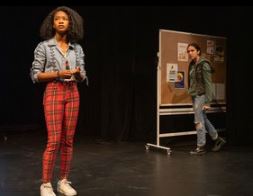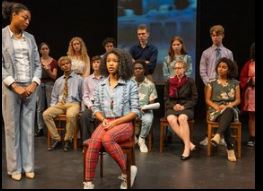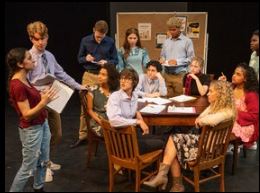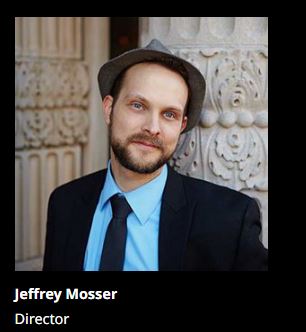First, a little bit of background on the Professional Training Institute!
The Professional Training Institute (PTI) is an advanced actor training program for students in 9-12 grade. The class of 2021/22 consists of 15 students from 10 different high schools including: Gabriela Bastardo (Golda Meir HS), Alexa Crump (Milwaukee HS of the Arts), Jonathan Edwards (Rufus King HS), Terynn Erby-Walker (Golda Meir HS), Ana Gutierrez (Ronald Reagan HS), Liam Jeninga (Delavan-Darien HS), Michael Loomans (Slinger HS), Kyra Mathias (Kettle Moraine School for Art and Performance), Molly McVey (Nicolet HS),
Yexuanj Rivera Melendez (Milwaukee HS of the Arts), Costello Mylott (Rufus King HS), Angel Rivera (Pius XI HS), Magdalyn Rowley-Lange (Ronald Reagan HS), Alexandria Woods (Rufus King HS), and Isabel Young (Walden III HS).
Just like last year, I went into this not knowing what to expect, and getting totally blown away by the experience. The Compass is a play as challenging as many of the others that the Rep has presented in the Stiemke Theater and the young people performed beyond what I expected of them. Just completely enthralling.
Now let’s get into the play a bit and then the performance. The Compass is billed as an interactive play…and as the Rep disclaims on their site, that doesn’t mean you will be hauled on stage to participate. But instead, in turn, the actors selected audience members as they entered the Stiemke and seated them in their designated area….and the group became their jurors and the area their jury box. So the audience is not acting, but not off the hook!

And the play’s content…a tech company has developed an app called The Compass. And after it gains access to your social media and you complete a profile questionnaire, it will make ‘decisions’ for you based on ‘your experience’ as recorded in the app, if you ask a question starting with “would i…’! And not unlike other contemporary apps, the young woman who is the main character relies heavily on The Compass to make her way through life. So as we move through the play, the questions multiply and the answers are always acted upon…and the big question that eventually gets asked after a major upheaval…is…how much responsibility does a person have for his/her actions if they are relying on this app?

So this is a very timely play. How much influence do we feel from social media or technology. And with the continued growth and development of artificial intelligence, is it inevitable that a real life app like The Compass will come to market? From the context in the play, it would seem that The Compass may be the apex of peer pressure.
So how does this play out in the play? Well we meet the characters in a rather random way it would seem. In little groups or clusters in vignettes and the time line is fluid, meaning one scene may be contemporary with the next one two years ago and the next a year from now. It is very effective story telling and the audience is kept up to date with the calendar date and relationship to the action being projected on the stage wall as the scenes change.

So the audience is kept a little off balance as we learn different facts in or out of order…and the reason that makes a difference…is the interactive nature of the play. At different points in the action…the action stops…and the actors visit their respective juries and ask a number of pointed questions that we discuss and the actor takes away a consensus or some pertinent quotes. These are worked into the play at different points and presented by the actors from the stage. And an interesting side note is the audience jury’s thoughts and ideas are also fluid and subject to change as new facts come into evidence as the timelines start to converge.
And the final focal point of the play is a trial, where Marjan (played by Terynn Erby-Walker) is on trial for a very serious transgression on her part…and the culpability for the event is the argument in the case. The prosecution of course puts the full responsibility on Marjan while the defense poses her as the victim of the technology that she has come to rely on to make decisions. It becomes a sticky mess…and far more complicated that it seems in my brief description here. But Michael Rohd provides us with seemingly valid reasons for both positions plus enough other data points to add additional doubt or conflict. At the end each audience juror has to vote guilty or not guilty and I’ll admit to changing my mind during the performance. And the final count at the Sunday matinee was 56 guilty and 55 not. I heard someone in the audience who had attended an earlier performance say that time it was 57 not guilty to 30 guilty.
Stand outs here start with Terynn Erby-Walker who is front and center much of the play. And although the character relies heavily on The Compass, Terynn also provides us with insight to a very thoughtful and involved high school student who takes on the adult world in a determined way…and is largely discounted. I also enjoyed Alexandria Woods as the prosecutor…very effective presence as someone who knows how to do what they need to do. Her opponent Jonathan Edwards as the defense attorney countered the prosecutor’s positions effectively and he too had the presence of a skilled and determined lawyer. And Gabriela Bastardo as Chaz, Marjan’s BFF who also uses The Compass but plays a more carefree character overall, unlike Marjan who often weighs her action. So Chaz is more of a just do it personality and unfortunately that mindset sets in motion the events leading to Marjan’s downfall.

Despite the amazing 2021/22 Milwaukee Repertory season that we just experienced, I think the PTI presentation of The Compass was the most rewarding theater I have seen this year.

and the rest of the creative team:

